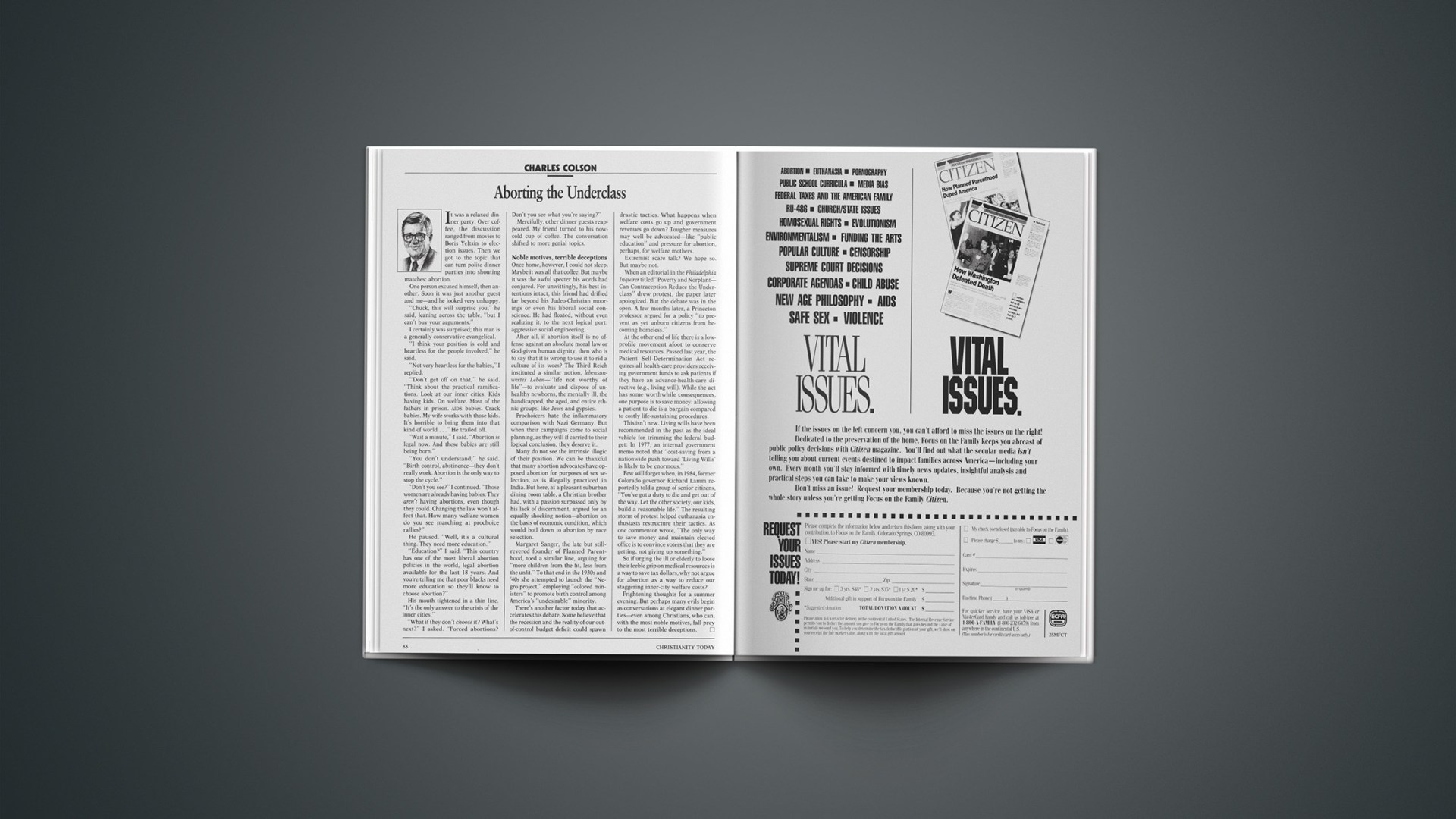It was a relaxed dinner party. Over coffee, the discussion ranged from movies to Boris Yeltsin to election issues. Then we got to the topic that can turn polite dinner parties into shouting matches: abortion.
One person excused himself, then another. Soon it was just another guest and me—and he looked very unhappy.
“Chuck, this will surprise you,” he said, leaning across the table, “but I can’t buy your arguments.”
I certainly was surprised; this man is a generally conservative evangelical.
“I think your position is cold and heartless for the people involved,” he said.
“Not very heartless for the babies,” I replied.
“Don’t get off on that,” he said. “Think about the practical ramifications. Look at our inner cities. Kids having kids. On welfare. Most of the fathers in prison, AIDS babies. Crack babies. My wife works with those kids. It’s horrible to bring them into that kind of world …” He trailed off.
“Wait a minute,” I said. “Abortion is legal now. And these babies are still being born.”
“You don’t understand,” he said. “Birth control, abstinence—they don’t really work. Abortion is the only way to stop the cycle.”
“Don’t you see?” I continued. “Those women are already having babies. They aren’t having abortions, even though they could. Changing the law won’t affect that. How many welfare women do you see marching at prochoice rallies?”
He paused. “Well, it’s a cultural thing. They need more education.”
“Education?” I said. “This country has one of the most liberal abortion policies in the world, legal abortion available for the last 18 years. And you’re telling me that poor blacks need more education so they’ll know to choose abortion?”
His mouth tightened in a thin line. “It’s the only answer to the crisis of the inner cities.”
“What if they don’t choose it? What’s next?” I asked. “Forced abortions? Don’t you see what you’re saying?”
Mercifully, other dinner guests reappeared. My friend turned to his now-cold cup of coffee. The conversation shifted to more genial topics.
Noble Motives, Terrible Deceptions
Once home, however, I could not sleep. Maybe it was all that coffee. But maybe it was the awful specter his words had conjured. For unwittingly, his best intentions intact, this friend had drifted far beyond his Judeo-Christian moorings or even his liberal social conscience. He had floated, without even realizing it, to the next logical port: aggressive social engineering.
After all, if abortion itself is no offense against an absolute moral law or God-given human dignity, then who is to say that it is wrong to use it to rid a culture of its woes? The Third Reich instituted a similar notion, lebensunwertes Leben—“life not worthy of life”—to evaluate and dispose of unhealthy newborns, the mentally ill, the handicapped, the aged, and entire ethnic groups, like Jews and gypsies.
Prochoicers hate the inflammatory comparison with Nazi Germany. But when their campaigns come to social planning, as they will if carried to their logical conclusion, they deserve it.
Many do not see the intrinsic illogic of their position. We can be thankful that many abortion advocates have opposed abortion for purposes of sex selection, as is illegally practiced in India. But here, at a pleasant suburban dining room table, a Christian brother had, with a passion surpassed only by his lack of discernment, argued for an equally shocking notion—abortion on the basis of economic condition, which would boil down to abortion by race selection.
Margaret Sanger, the late but still-revered founder of Planned Parenthood, toed a similar line, arguing for “more children from the fit, less from the unfit.” To that end in the 1930s and ’40s she attempted to launch the “Negro project,” employing “colored ministers” to promote birth control among America’s “undesirable” minority.
There’s another factor today that accelerates this debate. Some believe that the recession and the reality of our out-of-control budget deficit could spawn drastic tactics. What happens when welfare costs go up and government revenues go down? Tougher measures may well be advocated—like “public education” and pressure for abortion, perhaps, for welfare mothers.
Extremist scare talk? We hope so. But maybe not.
When an editorial in the Philadelphia Inquirer titled “Poverty and Norplant—Can Contraception Reduce the Underclass” drew protest, the paper later apologized. But the debate was in the open. A few months later, a Princeton professor argued for a policy “to prevent as yet unborn citizens from becoming homeless.”
At the other end of life there is a low-profile movement afoot to conserve medical resources. Passed last year, the Patient Self-Determination Act requires all health-care providers receiving government funds to ask patients if they have an advance-health-care directive (e.g., living will). While the act has some worthwhile consequences, one purpose is to save money: allowing a patient to die is a bargain compared to costly life-sustaining procedures.
This isn’t new. Living wills have been recommended in the past as the ideal vehicle for trimming the federal budget: In 1977, an internal government memo noted that “cost-saving from a nationwide push toward ‘Living Wills’ is likely to be enormous.”
Few will forget when, in 1984, former Colorado governor Richard Lamm reportedly told a group of senior citizens, “You’ve got a duty to die and get out of the way. Let the other society, our kids, build a reasonable life.” The resulting storm of protest helped euthanasia enthusiasts restructure their tactics. As one commentor wrote, “The only way to save money and maintain elected office is to convince voters that they are getting, not giving up something.”
So if urging the ill or elderly to loose their feeble grip on medical resources is a way to save tax dollars, why not argue for abortion as a way to reduce our staggering inner-city welfare costs?
Frightening thoughts for a summer evening. But perhaps many evils begin as conversations at elegant dinner parties—even among Christians, who can, with the most noble motives, fall prey to the most terrible deceptions.










